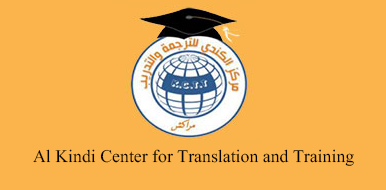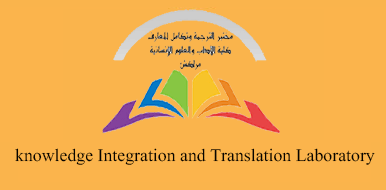

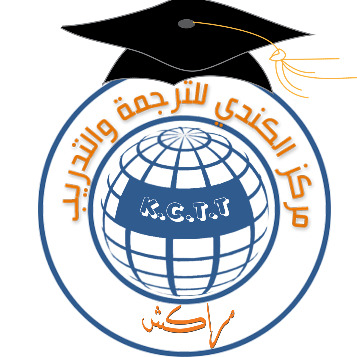
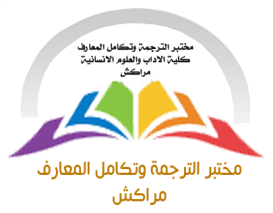
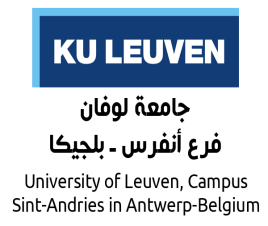
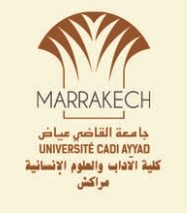
مركز الكندي للترجمة والتدريب
بالتعاون مع
مختبر الترجمة وتكامل المعارف بجامعة القاضي عياض بمراكش
وشعبة اللغة العربية والترجمة بجامعة لوفان (بلجيكا)
ينظم
المؤتمر الدولي الأول حول “الترجمة وأنماط النصوص”
في موضوع:
الترجمة الأدبية: من الترجمة إلى الإبداع
تكريما لفضيلة الأستاذ الدكتور حميد لحمِداني
13-14 فبراير 2019
في إطار سلسلة المؤتمرات الدولية التي يعتزم المركز بمعية المختبر تنظيمها سنويا حول “الترجمة وأنماط النصوص “، سيتم تخصيص المؤتمر الأول بحول الله لموضوع “الترجمة الأدبية: من الترجمة إلى الإبداع“. فالترجمة، بصفتها خطابا وممارسة، تعبر عن الحاجة إلى التواصل والتبادل، ليس فقط بين اللغات، بل أيضا بين الثقافات. لذلك فهي تضع أمام المترجِم تحديات ورهانات تدفعه إلى تجاوز المستوى اللغوي الصرف والانخراط في الحوار الثقافي بين الشعوب والحضارات.
من جهة أخرى، يتميز النص الأدبي بسمات صوتية ومعجمية وتركيبية ودلالية وتداولية، تجعل ترجمتَه عمليةً معقدة وشائكة، ومن ثمة تطرح على الباحثين قضايا نوعية وإشكالات خاصة. فلا يقتصر الأمر على نقل أفكار من لغة إلى لغة أخرى، أو استبدال كلمات اللسان الناقل بما يقابلها أو يرادفها في اللسان المنقول، ولا بنَسْخ التراكيب ومحاكاة الأساليب… وإنما بإعادة كتابة العملية الإبداعية برمتها، انطلاقا من منظور فلسفي ومعرفي، وبحس فني وجمالي.
إن الأدب باعتباره كتابة شخصية تخييلية، والترجمة باعتبارها جسرا بين الأنا والغير، كانا ولا يزالان يتبادلان علاقات وطيدة، مع أن كلا منهما يشكل مجالا بحثيا خصبا ورائدا، له خصوصياته وأدواته ومقاصده، فاللقاء بينهما يطرح صعوبات عديدة، تتمثل في خلق نوع من التوازي الإبداعي بين نسقين ثقافيين مختلفين ومتباينين على المستوى التاريخي والجمالي، وفي نقل مسالك الدلالة ودروب المعاني من زمن إبداعي إلى زمن آخر، ومن جغرافيا ثقافية إلى أخرى، ومن تأويل إلى آخر.
وبالإضافة إلى سياق النص الأدبي ونسقه الثقافي الخاص والعام، تطرح ترجمتُهُ صعوبات أخرى مرتبطة بعناصره اللغوية وصياغته الأسلوبية وبنائه الدلالي واستراتيجياته الترجمية والتأويلية. وهذا يقتضي أن يكون المترجِم منخرطا في عملية إبداعية شاملة تقوم على تَمَثُّل النص الأصلي في أبعاده المختلفة وفي جوانبه المتعددة، وعلى حُسْنِ تدبير ترجمته بحس إبداعي ورؤية متبصرة، تُحَقِّقُ الحوار المُنتِج بين اللسان الناقل واللسان المنقول، وبين النسق الأدبي للنص الأصلي ونسق النص المترجَم، مع مراعاة المقتضيات الفنية والجمالية والثقافية لكل منهما.
وقد حققت الممارسة الترجمية الأدبية، عبر تاريخها الطويل، تراكما كبيرا يسمح بمدارستها وفحص منطلقاتها وتَبَيُّن نقط قوتها وجوانب قصورها. كما عمل النقاد والباحثون، من جهتهم، على تحليلها وتقويمها والبحث في طبيعتها ووظيفتها وآليات اشتغالها. ونتج عن ذلك ظهور ميدان دراسي وحقل بحثي يتفاعل فيه عددٌ مُعتبَر من المفاهيم والتصورات والنظريات الخاصة بالترجمة الأدبية، انطلاقا من مرجعيات معرفية مختلفة ومن منهجيات متباينة، لسانية وتأويلية وفلسفية واجتماعية وثقافية وغيرها.
ولذلك يقترح مؤتمر “الترجمة الأدبية: من الترجمة إلى الإبداع“، نقاشا علميا متجددا حول طبيعة العلاقة بين الأدب والترجمة، وما يتصل بها من قضايا وإشكالات؛ من خلال بحوث نظرية ودراسات تطبيقية، باللغة العربية أو الإنجليزية أو الفرنسية. وذلك وفق محاور أساسية منها:
– خصوصيات الترجمة الأدبية وقضاياها المُميِّزة؛
– أهداف الترجمة الأدبية ورهاناتها؛
– صعوبات الترجمة الأدبية وإكراهاتها؛
– الترجمة الأدبية وحوار الثقافات؛
– الترجمة الأدبية في ضوء النظريات اللسانية؛
– الترجمة الأدبية بصفتها موضوعا للتنظير الترجمي؛
– الترجمة الأدبية من منظور النظريات الأدبية والمناهج النقدية؛
– الترجمة الأدبية من منظور الدراسات الثقافية المعاصرة؛
– الأدباء والمترجمون، أية علاقة؛
– الأدب العربي والترجمة؛
– الترجمة والأدب المقارن؛
– الترجمة عن لغة وسيطة؛
– شرائط ترجمان الأدب؛
– تحديات ترجمة البنية الصوتية في الأعمال الأدبية؛
– تحديات ترجمة الشعر؛
– نظرية المعادلة وترجمة النصوص الأدبية؛
– تحديات ترجمات المجاز في اللغة الأدبية؛
– نظرية الترجمة ونظرية الأدب.
لغات المؤتمر: العربية – الإنجليزية – الفرنسية
- شروط عامة للبحوث:
- أن يتسم البحث بالمنهجية العلمية ومواصفات البحث العلمي الرصين.
- يتم تبويب البحث على النحو الآتي:
- أ- عنوان المقال: ويضم: اسم المؤلف واسم الجامعة أو مؤسسة الانتساب.
- ب- ملخص في حدود 200 كلمة باللغتين العربية والإنجليزية.
- ت- ضرورة وضع الكلمات المفاتيح بعد الملخص.
- أن تتراوح صفحات البحث ما بين10 و 15 صفحة، مقاس(A4) ، وأن يكون خط المتن والعناوين(Times New Roman) بمقاس14، و (Times New Roman) بمقاس (12) في الهوامش، مع مراعاة مقاس واحد ونصف (1,5) بين السطور.
- ترقيم هوامش البحث في أسفل الصفحة مع الاكتفاء بكتابة اسم الكتاب والصفحة فقط، على هذا النحو:
- – علم الأصوات وتكامل المعارف: 123.
- تكتب العناوين الرئيسية بحجم الخط 18، والفرعية بحجم 16، مع جعل الخط بارزا.
- تحول الرسوم والأشكال الهندسية إلى صور، حفاظا على شكلها الأصلي.
- ترتيب قائمة المصـادر والمراجع في آخر البحث باعتماد عناوين المؤلفات، دون إغفال اسم المؤلف ورقم الطبعة ودار النشر ومكان النشر، وكذلك سنة النشر.
- مواعيد مهمة:
- آخر أجل للتوصل بملخص البحث، واستمارة المشاركة، وموجزالسيرة الذاتية: 30 – 05 – 2018 ؛ وستقوم لجنة التحكيم بالرد على الملخصات قبولا أو رفضا فور التوصل بها.
- آخر أجل للتوصل بالبحث كاملا:31 – 08– 2018.
- سيتم الرد على المقالات قبولا أو تعديلا أو اعتذارا قبل 15- 10 – 2018.
- تاريخ انعقاد المؤتمر: 13- 14 فبراير 2019
- مكان انعقاد المؤتمر: كلية الآداب والعلوم الإنسانية- مراكش المملكة المغربية.
- تبعث الملخصات والاستمارات والبحوث المقترحة للمشاركة إلى البريد الالكتروني:
- تطبع أعمال المؤتمر قبل انعقاده.
- رسوم المؤتمر:
- رسوم المؤتمر للمشاركين بورقة بحثية توافق عليها اللجنة العلمية 450 دولار أو ما يعادلها. وتغطي هذه الرسوم خدمات المؤتمر (حقيبة المؤتمر، كتاب المؤتمر، شهادة المشاركة) ونفقةَ الإقامة لمدة ثلاث ليال في فندق مصنف 4 نجوم، والتغذية والتنقل طيلة أيام المؤتمر. ملحوظة: رسوم المؤتمر لا تقبل التجزيء.
- لا تسلم شهادة الحضور إلا لمن حصل مسبقا على الموافقة.
- يتحمل المشارك نفقات السفر ذهاباً وإياباً.
منسقو المؤتمر:
د. عبد الواحد المرابط: قسم اللغة العربية
د. نور الدين حنيني: قسم اللغة الفرنسية
د. نور الدين عزمي: قسم اللغة الإنجليزية
أعضاء اللجنة العلمية:
| · د. أحمد كروم | · د. عبد الرحمن السليمان |
| · د. إديوس حسين | · د.عبد العالي المجدوب |
| · جامع اوشويض | · د. مولاي أحمد خبير |
| · د. عبد الواحد ابن ياسر | · د.عبد القادر مراح |
| · د. أحمد الراضي | · د. كمال فؤادي |
| · د.أحمد الحمزاوي | · د. مبارك أبو الرضوان |
| · د. خديجة الحياني | · د.مولاي مصطفى أبو حازم |
| · د. محمد حلو | · د.محمد فتح الله مصباح |
| · د.سعاد الكتبية | · د.الحسن بواجلابن |
| · د.حسن المودن | · د. بشرى شاكر |
| · د. رشيد أعرضي | · د. إبراهيم أسيكار |
| · د. أمال وسكوم | · د. عبد العزيز أيت بها |
| · د. محمد محاسن |
الإشراف العام:
- د. عبد الحميد زاهيد: مختبر الترجمة وتكامل المعارف- مراكش
- د. حسن درير: مركز الكندي للترجمة والتدريب – مراكش
- استمارة المشاركة + السيرة الذاتية
| الاسم الكامل | |
| الهاتف الشخصي | |
| البريد الإلكتروني | |
| الدرجة العلمية والتخصص الدقيق | |
| مكان العمل | |
| محور المشاركة | |
| عنوان المداخلة | |
| ملخص الموضوع | |
|
|
|
| موجز السيرة الذاتية | |
|
|
|
Al Kindi Center for Translation and Training
In collaboration with
The knowledge Integration and Translation Laboratory at Cadi Ayyad University, Morocco
And
The Department of the Arabic Language and Translation at the University of Leuven, Belgium
Organizes
The First Conference on Translation and Text Types
Under the theme
Literary Translation: From Translation to Creativity.
In honour of Professor Hamid LAHMIDANI
13 -14 February 2019
True to its tradition of organizing a series of annual symposia on issues related to translation and knowledege integration to promote better research and development and to facilitate the sharing of best practices and innovative approaches, Al Kindi Center for Translation and Training, in collaboration with the Knowledge Integration and Translation Laboratory at Cadi Ayyad University (Morocco) and the Department of the Arabic Language and Translation at the University of Leuven (Belgium), is proud to announce the organization of the first edition of a series of conferences addressing the interrelationship between Translation and Text Types. This first edition is devoted to Literary Translation: From Translation to Creativity.
Background
Translation as both a practice and a discourse increasingly involves linguistic as well as intercultural and communicative exchanges. Indeed, the translation process involves and engages the translator in issues that go beyond the linguistic structure of the text. Moreover, the literary text has its peculiarities and specifics, which make its translation a challenging and demanding task. Literary translation is not just about rendering ideas into the target language, but reproducing and maintaining the creativity and stylistic features of the source text. Literature is a form of creative writing of recognized artistic value. Translation, on the other hand, acts as a bridge between the “we” and the “other”, rendering the writings of the other in a different language. Though translation and literature have different characteristics, they have always been closely linked to each other, mutually influencing one another. Thus, the ultimate objective of this symposium is to explore and investigate how these links are interwoven, establish parallel and creative bridges between two cultural systems that are different at the historical and aesthetic levels, and ensure a smooth transition of the semantic changes and nuances of meaning from one creative universe into another. In addition to its particular and general cultural context, the translation of literary texts still poses problems related mainly to linguistic structures, stylistic aspects, semantic features as well as translational and interpretative strategies. Therefore, translators are called upon to demonstrate more creative translation strategies when it comes to the translation of literature. They should combine their understanding of the source language text with their skills in reproducing it into the target language in order to foster a useful interaction between the two involved languages as well as ensuring the literary systems of the original and translated texts, taking into account the artistic, aesthetic and cultural specificities of each one of them.The evolution of literary translation has increased over the course of its history, allowing further investigation of past practices and more assessment of its strengths and weaknesses. Critics, in turn, have considered its analysis and evaluation and examined its nature, functions and mechanisms. Thus, an interdisciplinary academic field has emerged including a number of theories and approaches that are based on different disciplines and methodologies. Conference working languages The working languages of the conference are Arabic, French and English.
The conference research axes include, but are not limited to:
▪ The specificities of literary translation and related issues▪ The problems of literary translation▪ Constraints and challenges of literary translation▪ Literary translation and intercultural dialogue▪ Literary translation and linguistic theories▪ Literature and the theorization of translation▪ Literary translation seen from the perspective of literary theories and critical methods▪ Literary translation and contemporary cultural studies▪ Writers vs. translators▪ Literary translation as a form of literary creativity▪ The challenges of translating Arabic literature▪ Translation and comparative literature▪ On retranslating translated texts Important dates ▪ Deadline for proposal submission: May 30, 2018. ▪ Submission of final papers: August 30, 2018▪ Notification of acceptance after blind reviewing: October 15, 2018. ▪ Conference date: 13-14 February 2019.▪ Conference venue: Faculty of Arts and Humanities, Marrakech, Kingdom of Morocco.▪ Abstracts and participation forms should be sent to: alkindiconference07@gmail.com▪ Conference proceedings are to be published before the conference.▪ APA reference style required. Participation fees ▪ $ 450 or equivalent (conference documents, participation certificate, accommodation, meals and coffee breaks are included)▪ Travel expenses to be covered by participants Conference coordinators Abdelouahed LAMRABETNoreddine HANININoureddine AZMI Scientific committee
| – Ahmed Kerroum
– Lhoucine Idyouss – Jamaa Ouchouid – Abdelwahed Bnou Yassir – Ahmed Radi – Ahmed El Hamzaoui – Khadija El Hayani – Mohamed Hailou – Souad El kouttoubia – Hassan El Moudden – Rachid Aaradi – Amal Oussikoum – Mohamed Mahassine |
– Abied Al-Sulaiman
– Abdelali Majdoub – My Ahmed Khabir – Abdelkader Marrah – Kamal El Fouadi – Mbarek Abouridouane – My Mustapha Abouhazim – Mohamed Fathallah Misbah – Hassan Bouijelabn – Bouchra Chakir – Brahim Assikar – Abdelaziz Ait Baha |
Overall supervision
| Dr. Abdelhamid ZAHID | (The Knowledge Integration and Translation Laboratory) |
| Dr. Hassane DARIR | (Al Kindi Center for Translation and Training
Coordinator of Master Translation Technology and Specialized Translation) |
Participation Form
| Full name | |
| Phone number | |
| Position and academic discipline | |
| Institution | |
| Participation axis | |
| Presentation title | |
| Abstract | |
| Bio data
|
|
Le Centre Al Kindi de Traduction et de Formation
En collaboration avec le Laboratoire Traduction et Interdisciplinarité
Faculté des Lettres et des Sciences Humaines – Marrakech
Et le Département de Langue Arabe et de Traduction
Université de Leuven – Belgique
Organise
Le premier colloque international sur la traduction et la typologie des textes
Sur le thème
La traduction littéraire : de la traduction à la créativité
En hommage au Professeur Hamid Lahmidani
13 et 14 février 2019
En collaboration avec le Laboratoire Traduction et Interdisciplinarité de l’Université Cadi Ayyad et le Département de Langue Arabe et de Traduction de l’Université de Leuven, le Centre Al Kindi de Traduction et de Formation organisera une série de colloques internationaux qui s’intéressent à la réflexion sur « la traduction et la typologie des textes ». La première édition portera notamment sur le thème : La traduction littéraire : de la traduction à la créativité. Ces colloques, outre ceux sur la traduction des sens du Coran, s’inscrivent dans la belle tradition, instaurée par le Centre Al Kindi en collaboration avec le Laboratoire Traduction et Interdisciplinarité, d’organiser une série de colloques annuels sur une problématique liée à la traduction, avec, à chaque fois, une thématique précise.
La traduction, en tant que pratique et discours, exprime un besoin de communication et d’échange non seulement interlinguistiques, mais aussi interculturels. Ce qui revient à dire que la traduction soulève des enjeux qui engagent le traducteur au-delà du strict plan linguistique.
Par ailleurs, le texte littéraire présente des particularités qui le différencient des autres textes. Par conséquent, sa traduction, elle aussi, se distingue par des caractéristiques particulières. Dans la traduction littéraire, il n’est pas question uniquement de rendre des idées, mais aussi de reproduire une créativité, à partir d’une perspective philosophique et cognitive, ainsi qu’avec un sens artistique et esthétique.
La littérature, en tant qu’écriture personnelle, et la traduction, en tant que passage par l’écriture de l’autre, ont depuis toujours maintenu des liens très étroits, tout en étant, chacun, un terrain d’études largement balisé. Dans ce cas, l’enjeu majeur est doublement soulevé : d’une part, parvenir à établir un certain parallélisme, basé sur la créativité, entre deux systèmes culturels qui présentent des écarts sur les plans historique et esthétique ; d’autre part, transposer les décalages sémantiques et les nuances de sens d’un univers créatif à un autre, d’une géographie culturelle à une autre, d’un acte interprétatif à un autre.
C’est dire si le texte littéraire pose des problèmes en matière de traduction. Ceux-ci se rapportent essentiellement à ses éléments linguistiques, à ses tournures stylistiques, à sa structure sémantique et à ses stratégies traductionnelles et interprétatives. De ce fait, le traducteur est appelé à faire preuve de créativité qui intègre la compréhension du texte de départ et sa réécriture en traduction, de façon à favoriser un dialogue fructueux entre, d’un côté, les deux langues en présence et, de l’autre, le système littéraire du texte de départ et celui de la traduction, en tenant compte des spécificités artistiques, esthétiques et culturelles relatives à chacun d’eux.
L’évolution de la pratique de la traduction littéraire a proliféré au fil de son histoire, de manière à permettre d’étudier ce type de traduction, de retracer ses origines et de déterminer ses points forts tout comme ses limites. Les critiques, pour leur part, se sont penchés sur son analyse, son évaluation et l’examen de sa nature, de sa fonction et des mécanismes de son fonctionnement. C’est ainsi que s’est constitué sur la question un champ disciplinaire dans lequel interagissent bon nombre de théories fondées sur des références et des méthodologies de divers ordres : linguistique, interprétatif, philosophique, social, culturel, etc.
Les langues du colloque sont l’arabe, le français et l’anglais et les communications pourront être d’ordre théorique ou proposer une analyse de texte.
Les axes suivants nourriront la réflexion lors du colloque, sans pour autant s’y limiter :
– les spécificités de la traduction littéraire et les questions qui lui sont propres ;
– les enjeux entourant la traduction littéraire ;
– les contraintes qui pèsent sur le processus de la traduction littéraire ;
– la traduction littéraire et le dialogue des cultures ;
– la traduction littéraire à la lumière des théories linguistiques ;
– la littérature comme un lieu de théorisation de la traduction
– la traduction littéraire vue dans la perspective des théories littéraires et des méthodes critiques ;
– la traduction littéraire envisagée dans l’optique des études culturelles contemporaines ;
– les écrivains et traducteurs ;
– la littérature arabe à l’épreuve de la traduction ;
– la traduction et la littérature comparée ;
– traduire à partir d’une langue intermédiaire.
Dates importantes à retenir
- Date limite de remise du résumé (200 mots), du formulaire de participation et d’une notice bio-bibliographique : 30/05/2018.
- Remise des textes définitifs : 31/08/2018.
- Notification d’acceptation : 15/10/2018.
- Date du colloque : 13 et 14 février 2019.
- Lieu de tenue du colloque : Faculté des Lettres et des Sciences Humaines, Marrakech, Royaume du Maroc.
- Les résumés, les formulaires de participation et les communications doivent être envoyés à l’adresse : alkindiconference07@gmail.com
- Les actes de colloque seront publiés avant le colloque.
- Citer les références selon les normes de l’APA.
Frais du colloque
- 450 $ (ou équivalent) incluant les services du colloque : les documents du colloque, les actes de colloque, l’attestation de participation, l’hébergement, les repas et le transport durant la période du colloque.
- Les frais de voyage sont à la charge des participants.
Coordinateurs du colloque
Abdelouahed Lamrabet, Noreddine Hanini et Noureddine Azmi.
Comité scientifique
| – Ahmed Kerroum
– Lhoucine Idyouss – Jamaa Ouchouid – Abdelwahed Bnou Yassir – Ahmed Radi – Ahmed El Hamzaoui – Khadija El Hayani – Mohamed Hailou – Souad El kouttoubia – Hassan El Moudden – Rachid Aaradi – Amal Oussikoum – Mohamed Mahassine |
– Abied Al-Sulaiman
– Abdelali Majdoub – My Ahmed Khabir – Abdelkader Marrah – Kamal El Fouadi – Mbarek Abouridouane – My Mustapha Abouhazim – Mohamed Fathallah Misbah – Hassan Bouijelabn – Bouchra Chakir – Brahim Assikar – Abdelaziz Ait Baha |
Supervision du colloque
Abdelhamid Zahid (Laboratoire Traduction et Interdisciplinarité)
Hassane Darir (Centre Al Kindi de traduction et de Formation Coordinateur du Master Translation Technology and Specialized Translation)
Formulaire de participation
| Nom et prénom | |
| Téléphone personnel | |
| Fonction et spécialité | |
| Institution | |
| Axe de participation | |
| Intitulé de la communication | |
| Résumé | |
| Notice bio-bibliographique | |
Report of the First Conference on Translation and Text Types
Under the theme
Literary Translation: From Translation to Creativity.
In honour of Professor Hamid LAHMIDANI
13 -14 February 2019
Translation of metonymical color Expression
The speaker started the presentation with a brief definition of metonymy in the Arabic literature. As defined by the speaker, metonymy is a figure of speech in which a thing or a concept is referred to by the name of something closely associated with that thing or concept. Because of the explicitness of this figure of speech, it is given less heed compared with other ones. However, when metonymy includes color expressions, it becomes highly problematic since colors are usually culturally bound. The presentation contained many examples from Holy Qur’an and Prophetic Traditions. To render this figure of speech, the following techniques were suggested:
- Provide a metonymical color expression that is functionally equivalent to that of the source text.
- When a functionally equivalent color is not available in the target language, the translator could result to the reduction of metonymy to the sense.
The text type should be taken into consideration because it is one of the elements that would help the translator decide about the most accurate procedure to adopt in the rendering of a certain metonymical color expression. Furthermore, the reader’s response to this figure of speech should be highly considered. This later was suggested as a topic of research for the students.
Translation: a manipulative or creative act?
Dr. Hanan Benoudi started her presentation by appreciating the efforts of the organizing committee of this international conference. She then moved on to the subject of her research, which aims at emphasizing that translation may turn from being a mere linguistic process into a cultural act of deconstruction and reconstruction that gives rise to a new, unique text for a new readership in a new socio-cultural milieu. She stated that when a text moves to a different culture it ends up by being a different creature. To this end, Dr. Bennoudi introduced a comparative analysis of two translations of works by the Moroccan writer Mohamed Choukri, namely Alkhobz alhafi and Ashattar.
She investigated a number of problems in translation carried out by Paul Bowles and Emery such as the inadequacies and mistranslations in an attempt to demonstrate that translation cannot always be a complete match between SL and TL, and that translators work under different constraints such as language barriers, cultural and geographical differences. She concluded that despite some misrenderings, this research shows how translation has become to be considered as a form of rewriting and how the translated text is considered as a new text that is born after a process of deconstruction and reconstruction
Session: Literary Translation Difficulties
The presentation given by Ms Chaal Houaria was centered around literary translation difficulties, namely the cultural barriers. The speaker used illustrating examples from the English translation of the 1972 novel “For Bread Alone” that was translated to 36 languages. She described translation as a cultural transfer taking into consideration the sociocultural aspect of the text. One of the main problems a translator could be faced with in this text type is finding the lexical equivalents for certain objects and events which are not known in the target culture. Thus, the translator mission is to bridge the cultural gaps that exist between source and target cultures. In order to fulfill this mission, a number of translation theorists have proposed some methods. Newmark, for instance, proposes transference and componential analysis while Nida comes up with the concept of formal and dynamic equivalence. Other methods are presented by Vinay and Darblenet and try as well to help overcome the literary translation barriers. The translation of the novel “ For Bread Alone” to English is rich with examples that illustrate the use of these methods as well as cases where the cultural difficulties were very prominent.
Translating Cultural Expressions from Arabic into English of Mahfouz’s “The Thief and the Dogs”
By Ahmad Al Harasheh
Yarmouk University, Jordan
In his talk, Professor Ahmad Al Harasheh aimed at investigating the problems that Translators face when translating culture–bound expressions from Arabic to English. To achieve the goal of his study, the researcher selected samples from Najib Mahfouz’s masterpiece “The Thief and the Dogs”. The researchers started his talk by stating that his study is not aimed to criticize the translation made by Trevor Le Gassick, M.M. Badawi (1984) but rather provide alternatives. He then presented a brief summary of the novel. The Professor explained the reason behind his choice as the Egyptian colloquial expressions are difficult to be translated into English because there is no adequate equivalent in the English culture. Dr. Al Harasheh presented some mistranslated samples in “The Thief and the Dogs”. The results of the study revealed that translators encounter different kinds of problems when translating cultural expressions mainly: when the translator is unfamiliar with cultural expressions, when he/she fails to achieve the equivalence in the target language, ambiguity of some cultural expressions or lack of knowledge of translation techniques and translation strategies. In light of these results, the researcher recommended Vinay and Darbelnet translation Techniques.
In her paper entitled Purposes of Circumlocution and Strategies of its Translation in Literary Texts, Prof. Fatima Oukhadjou, from Cadi Ayyad University (Morocco) investigates the phenomenon of circumlocution in literary texts, its purposes and strategies. She seeks to answer the question as to whether circumlocution is a healthy phenomenon that should be maintained because it adds stylistic, rhetorical and prosodic beauty to the literary text or a mere repetition that should be avoided. Examining some examples from her case of study, a short story from Benjaloun’s collection, Ašwaq wa Ašwak (1988), she lists four main reasons behind the use of circumlocution. These are: 1) mentioning a specific concept after a general one, 2) the confirmation of warnings, 3) clarity after ambiguity, and 4) paraphrase. At the end of her paper, Prof. Fatima Oukhadjou lists some strategies translators should use to maintain circumlocution in their translation of literary texts.
Professor Lahosseine Id-Youss introduced his contribution by stressing the role of cultural distance in cross-literary communication. The ease or the difficulty of rendering artistic creation depends, to a large extent, on whether two cultures or subcultures are close to each other. That is, the affinities or discrepancies related to religion, legal systems, political systems, norms and values have the upper hand in shaping creative translation.
Afterwards, he tackled the constraints which translators encounter. The first of these restrictions is the figurative use of language, which prevents the message from being readily accessible. This reflects the inherently aesthetic dimension of literature. In fact, it is a distinctive feature of art and poetry, in particular. The Professor cites Lakoff, who managed to change our perception of metaphors. The latter rightly affirms that metaphors are not confined to creative writing, for they are rooted in our thinking. Besides, the structure of speech is another hurdle that translators should reckon with. Indeed, tropes such as alliteration, assonance, antithesis, onomatoepia, repetition and rhyme are considerably challenging. Another element that further complicates the process is humour, especially if it is culture-bound. And last but not the least, language evolution must be taken into account as meaning changes over the years.
This notion of cultural distance is closely related to the dichotomy of domestication and foreignization. Should we stick to the source text and culture, or should we favour the target text? I f we go for the second option, a number of burning questions arise. Given the fact that norms of target audiences are diverse, do we have to please a big number of colures with their tastes and expectations? Norms also change over time. More, high culture and elevated art are elitist, whether we acknowledge this fact or not, especially in underdeveloped countries, where education and culture are not given their due. Do we have the right to destroy fine literature to please philistines? What about translators who make a living by translating when they feel bound to succumb to the dictations of publishers at the expense of their convictions?

